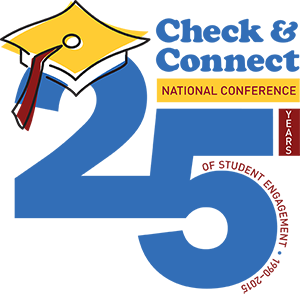

Main navigation | Main content

Concurrent sessions are divided into four themed tracks: 1) Stories from Current Check & Connect Implementation Sites, 2) Tips for Implementing Check & Connect, 3) Sustaining Check & Connect, and 4) Research.
Colleen Kaibel, Dropout Prevention Coordinator, Minneapolis Public Schools
Since 2002, Minneapolis Public Schools has expanded Check & Connect from 2 to 26 schools with 70 Check & Connect staff. Colleen Kaibel is the MPS district Dropout Prevention Coordinator and has implemented Check & Connect since 1995. Kaibel will speak to development, implementation, sustainability, fidelity, and evaluation of Check & Connect over the last thirteen years in MPS and how you can replicate the model in your school or community.
Dennis W. Olson Jr., M.Ed., Director, Office of Indian Education, Minnesota Department of Education
As essential component of Check & Connect is working with families to support their student's engagement in education. Nowhere is supporting family members who support their children in school more important than in the American Indian community. Relationships are key and the ability to create a welcoming environment in public school can be very challenging. This presentation will describe how American Indian home school liaisons create a bridge between school and family in Minnesota and how these strategies may be transferable to other cultures as well.
Cammy Lehr, Ph.D., GradMinnesota Project Manager, Minnesota Alliance With Youth
Eileen Klemm, M.A., Check & Connect Project Coordinator & Trainer, Institute on Community Integration, University of Minnesota
Sandy Schmitz, Ph.D., Research Associate, Institute on Community Integration, University of Minnesota
How does the Check & Connect model relate to state level initiatives such as GradMinnesota and State Systemic Improvement Plans? Find the answer in this two part session. First you will learn about GradMinnesota and the relevance of Check & Connect as an effective strategy to engage children and young people in school and learning. GradMinnesota is an initiative of Minnesota Alliance With Youth, Minnesota Department of Education, and the Office of the Governor. Second, you will learn how Check & Connect fits within an SSIP framework Topics addressed will include implementation science, root cause analysis, theory of action, and evaluation in the scaling-up of Check & Connect at the state level. All states are required to submit SSIPs to the Office of Special Education (OSEP) on an annual basis.
Amy Susman-Stillman, Ph.D., Co-director, Center for Early Education and Development (CEED)
Karen Storm, Ph.D., Research Associate, Center for Early Education and Development, University of Minnesota
Preparing young children for success in school, particularly those at-risk for educational disparities, includes ensuring families have the knowledge and resources to promote early learning, children consistently attend preschool, and children participate in developmentally appropriate learning opportunities at home and school. In this session, we will discuss innovative models of home-school partnerships and how they are being used with families to promote preschool attendance, student and family engagement in school, and children’s school readiness.